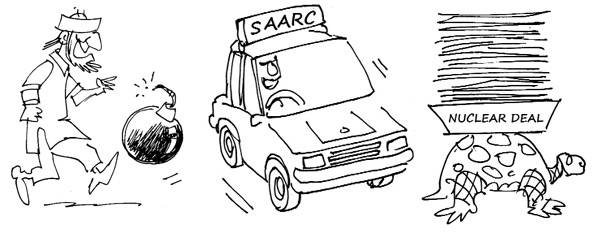
Fair unfair
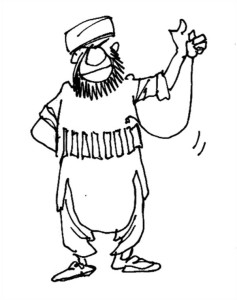
Sir,
C Christine Fair’s February 9 article “Ten Fictions that Pakistani Defense Officials Love to Peddle” seems to be a response to Stephen M Walt’s February 3 Foreign Policy magazine article “The Top 10 Mistakes made in Afghanistan”, which is part of the growing anti-war criticism against the Obama administration. According to Walt, America’s trying to go it alone, blowing it at Tora Bora, helping introduce the Afghan constitution, the detour into Iraq, the 2009 surge, setting a time limit, downgrading diplomacy, losing public support, failure to manage unruly allies, and strategic contradictions are the top ten reasons of the US Afghan war failure, which Ms Fair probably tries to justify in her recent article. Ms Fair’s long stay in Pakistan, especially her teaching engagements in Lahore, where her frequent interactions with top Afghan war observers including the “Descent into Chaos” author Ahmed Rashid, led to the compiling of her new book “Fighting to the End: the Pakistan Army’s Way of War”.
She rightly says about the just resumed “strategic dialogue” between the US and Pakistan that it “has never been strategic”, thanks to the “carrot and stick policy” and “do more mantra” of her governments that have been dictating terms in the name of “strategic partnership”, “natural allies”, “friendship” and “strategic dialogue” – referring to then Assistant Secretary Armitage’s “or else we will send you to the stone age” threat, and Secretary Collin Powell’s 11-point demands.
“The US policymakers never fully appreciated that the war could not be won without Pakistan’s cooperation,” argues Walt. Christine Fair says “everyone knows and has known that Pakistan is key to the equation… The problem was not lack of understanding about Pakistan’s importance. The problem was, by and large, a naïve belief in Pakistan’s desire to cooperate and a miscalculation about how Pakistan perceives its national interests.”
Eschmall Sardar,
Peshawar.
SAARC remark
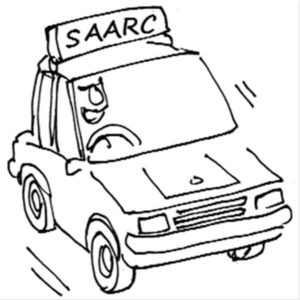
Sir,
To be able to answer the question how effective the South Asian Association for Regional Cooperation (SAARC) has been, a quick look at its background will have to be taken. SAARC is an economic and geopolitical union of eight member nations that are primarily located in the South Asian region. Its secretariat is headquartered in Katmandu, Nepal. The idea of regional political and economic cooperation in South Asia was first coined in 1980, and the first summit was held in Dhaka on December 8, 1985 that led to its official establishment by the governments of Bangladesh, Bhutan, India, Maldives, Nepal, Pakistan, and Sri Lanka. In the intervening years, its successors have grown in size by the accession of new member states. Afghanistan was the first to have been admitted in the physical enlargement of the SAARC in 2007.
SAARC policies aim to promote welfare economics, collective self-reliance among the countries of South Asia, and to accelerate socio-cultural development in the region. All that SAARC remains a distant dream. It may have achieved some successes in some of the areas but the achievements cannot be termed as significant. Much remains to be desired on all fronts. Unambiguously, SAARC could have been a very effective body had its members sincerely endeavored to work collectively and cogently towards the attainment of all its objectives.
The South Asian region stands out in today’s terror-stricken and volatile world conspicuously. The war on terror has had a horrific impact on South Asia. Terrorism has been spreading throughout the region at an incredibly fast pace. The fact of the matter is it has now gone beyond control. Pakistan has been declared a terrorist state. South Asia has been branded by the developed societies of the world as the most dangerous region in the globe. The region has undoubtedly become more insecure and unstable. Had there been unanimity of thought and action among the SAARC member countries, and had they converged on one platform to genuinely address and attain all SAARC objectives, this important regional body could have proven to be an effective body that could have stood up with courage and honor in the comity of world nations and successfully assert itself on both regional and world issues.
M Fazal Elahi,
Islamabad.
Fission and confusion
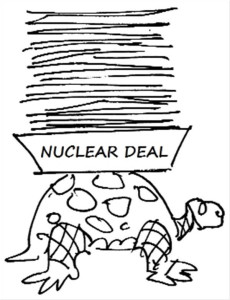
Sir,
The Pakistani government is all set to begin work on a nuclear power plant in Karachi with Chinese assistance. After the inauguration of the Karachi nuclear plants, all eyes will be on Washington, and not on Beijing or Islamabad.
Right since the US announced in July 2005 that it would sign a nuclear deal with India, Pakistan has been asking for a similar deal that would allow nuclear trade with the entire nuclear suppliers groups (NSG). Washington has been saying Islamabad does not qualify for such an agreement.
For many analysts, Washington has undermined its ability to oppose Pakistan-China nuclear cooperation on legal grounds after the complications created by its own nuclear deal with New Delhi. According to Brad Glosserman, executive director of the Pacific Forum Center for Strategic and International Studies, “We all knew at the time that a nuclear agreement such as the India-US one would have consequences for the non-proliferation regime and that’s what you are seeing now.”
The India-US nuclear deal had not only violated the Non-Proliferation Treaty, but had also violated the Hyde Act of 2006. In contrast, the Pakistan-China agreement is only for power generation and has a legal cover. The deal between Beijing and Islamabad was signed long before China became a member of the NSG or the NPT. Even Germany attested the claim that Chinese export of reactors to Pakistan is covered by the existing policies and understandings of the NSG. Since joining the group in 2004, China has played according to the NSG’s voluntary rules, despite a long tradition of nuclear association with Pakistan.
China is an emerging nuclear giant. Sixty percent of the reactors under construction in the world today are in China and Chinese industries are investing billions of dollars to make equipment for these reactors. China is a main supplier of components for US nuclear power plants under construction, Britain has allowed Chinese companies to buy majority stakes in British nuclear power plants, Australia and Canada have also inked nuclear agreements with China, and the China Atomic Energy Agency is cooperating with 31 members of the Organization for Economic Co-operation and Development (OECD). This immense scope of the Chinese nuclear industry is a deterrent against any opposition to the Sino-Pak nuclear cooperation.
When the legal battle was lost, a smear campaign was initiated that the two AP-1000 reactors Pakistan is buying from China are untested. After the Fukushima disaster, Beijing called for a comprehensive safety check and revision of safety standards for all nuclear plants made in China. So the concerns about the design of AP-1000 are far-fetched.
In my view the nuclear partnership between Pakistan and China is justifiable, and the US should support the energy-deficient Pakistan by encouraging the nuclear deal between Pakistan and China. Stephen Cohen, an eminent American expert on South Asia, has asked Washington in his latest book “Shooting for a Century: The India-Pakistan Conundrum” to formally recognize Pakistan’s nuclear status through civilian cooperation.
Hasan Ehtisham,
Islamabad.
On the fly
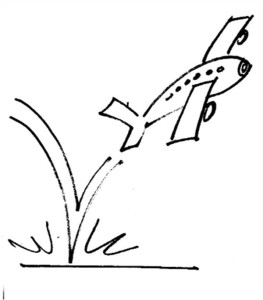
Sir,
The decision to finally utilize enormous revenues generated by the Civil Aviation Authority (CAA) of Pakistan to install the ILS Cat3 system at Lahore will be a beginning of a major overhaul of regulatory body. It is a step towards modernization, in terms of technology and the manpower recruited to handle technology for ensuring the safety of air traffic.
The CAA is primarily a regulatory body and therefore steps should be taken so that airports are run by independent boards, along with an independent Accident Investigation Unit, not under administrative control of the regulatory body.
While the decision to induct medium range aircraft not over seven years old in the PIA is a wise one technically, this alone will not achieve the desired revenue generation, unless the top management that has monopolized the executive corridors of the airline are not sent on forced early retirement, for they are part of the problem and therefore cannot have a role in the solution.
It is the PIA’s Corporate Planning and Procurement divisions, along with Marketing and Finance to some extent, that have made the previous business plans, such as that submitted in 2002 for B777, which failed to achieve declared objectives and targets. Even automated revenue management and reservation systems have been rendered useless by the powerful nexus of corrupt PIA executives and few travel agents, leading to the fleecing of Umrah and Haj pilgrims and losses for the airline.
As long as the mediocrity and corruption dominated executive corridors of PIA are not cleansed of the rot, revenue pilferage and financial improprieties will continue. Induction of more aircrafts will meet same fate that previous business plans. For starters, the special assistant for aviation should ensure forensic audit and verification of qualifications, age certificates and other data of its paid senior executives, plus a scrutiny of assets accumulated not only in Pakistan, but also abroad.
Ali Malik,
Lahore.
Above the law

Sir,
The alleged extra judicial killing of an MQM activist Salman Nooruddin must be condemned, but so must be the brutal murder of Wali Babar and thousands of others who have fallen victims to target killings, extortion, and kidnapping by goons of political criminal gangs. This cycle of violence started with body bags of political opponents emerging from all parts of Karachi and discovery of scores of torture cells in the late 80s and 90s. Billions of rupees earned by organized criminal mafia attracted others, including terrorists affiliated with religious extremists and sectarian and ethnic hate groups.
The manner in which lawyers, prosecutors, eyewitnesses and policemen involved in the murder of Wali Babar have been killed, should have evoked the state to establish its writ, which it has failed to do so far despite all its might and power. The state must be seen as enforcing the rule of law, otherwise criminals, be they associated with TTP, political parties, or land or drug mafia, will continue to exert their hegemony.
Criminals must be nabbed, wherever and whenever they appear, be it a wedding, birthday party or any other occasion. Those responsible for target killings of hundreds of policemen on duty must be made to pay for their sins. Law must take its course and not be blackmailed by threats of protests or shutdowns. In the words of Roosevelt, “No man is above the law and no man is below it, nor do we ask any man’s permission, when we ask him to obey it.”
Rahat Siddiqi,
Karachi.
Takes two to tango
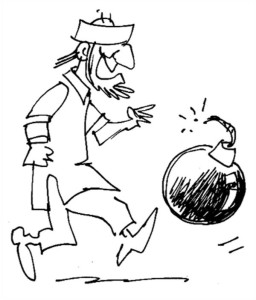
Sir,
While negotiations are the best way of resolving differences, it takes two to tango. It is not possible to achieve results from peace talks if one side continues to target and kill at will, while asking other to cease all operations against elements that the constitution considers criminals who challenge the writ of the state.
The unfortunate irony is that even in such times, retired soldiers and self-appointed defense analysts claiming immunity for former military ruler Pervez Musharraf are making the argument that the constitution can be violated to save the state – as if being armed gives one such a right.
The Taliban have also assumed unto themselves the right to solely interpret Sharia as they deem fit, even if such an interpretation contradicts that held by a large majority of peaceful Muslims and clerics. The government-nominated negotiation team headed by Irfan Siddiqui seems to be unfamiliar with the art of negotiations. He got carried away after the first meeting, making a statement that raised hopes and expectations, although real talks have not even begun yet. Media statements should only be made by government officials, not the members of the negotiations team.
We must also remember that the Sharia practiced during the life of the Holy Prophet (PBUH) does not give any Muslim the right to kill others only because of a difference of opinion. Nowhere in Islam is it allowed to abduct innocent human beings for ransom, or indulge in unlawful trade to raise funds for warfare, nor is it allowed even in war to harm citizens. It is not permissible to recruit child soldiers for warfare, or their brainwashing for carrying out suicide missions outside battle arena, targeting unarmed men, women and children. Islam teaches tolerance for dissent, it gives women the right to choose who they marry, and prohibits murder or torture of prisoners of war.
Matters of religion and faith should be left to the Almighty. The state should only intervene when such transgressions pose a threat to the society and infringe upon rights of others, such as when men with weapons assume the right to impose their opinion on others, challenging the writ of the state and weakening its defense.
Tariq Ali,
Lahore.

